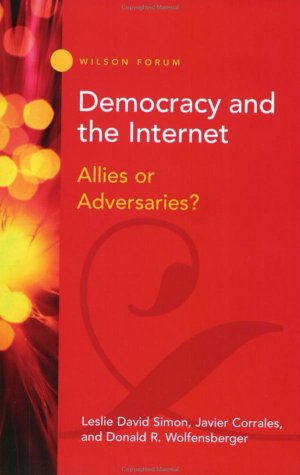Is the internet intrinsically democratic, making every user a publisher and supporting new varieties of expression and association? Or is it a dangerous vehicle of propaganda, helping repressive governments to deceive their people and mobs to drive democratic governments to extremes? In Democracy and the Internet: Allies or Adversaries? three essays draw evidence from starkly different regions of the world. Leslie David Simon turns to one of the world's least democratic regions, the Muslim nations of the Middle East; Javier Corrales reviews the weak democracies of Latin America, and Donald R. Wolfensberger studies the world's most visible representative institution, the U.S. Congress. The authors find that the internet is generally making a positive difference. In some places people are newly receiving important outside news and communications. In others, human rights organizations and banned newspapers can make their cases online for both domestic and international audiences. Use by extremist groups has caused little damage compared to the benefits.
The chief hangup is limited availability, either because the market is too weak to spread technology without government support or because repressive states are restricting access. At Congress, the internet was crucial in preserving operations when the post-September 11 anthrax attack shut down Capitol Hill, and more opportunities exist, but there is also the danger of overload.
- ISBN10 1930365098
- ISBN13 9781930365094
- Publish Date 3 September 2002
- Publish Status Out of Stock
- Out of Print 16 March 2021
- Publish Country US
- Imprint Woodrow Wilson Center Press
- Format Paperback (US Trade)
- Pages 124
- Language English
